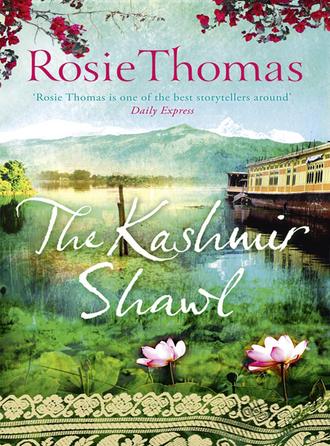
Полная версия
The Kashmir Shawl
‘Yes, pure silk pashmina mix. Twelve hundred rupees. Look, this pink one and this lovely blue-turquoise. Christmas is coming, think of gifts for your friends. Three for three thousand.’
‘Do you have any kani woven shawls? Or embroidered pieces?’
The man looked up. ‘Ah, yes. You know the best, madam. I show you.’
He unlocked a cabinet and brought out another pile. Like a magician he shook out more coloured breadths of fabric, whisking and flourishing them in front of her. Mair picked up the nearest one and let the folds slide through her fingers. She bent her head briefly to examine the floral design in reds and violet, then wound the shawl over her shoulders.
‘So nice,’ the Kashmiri approved. ‘These colours just right for you.’
It was nothing like the other one. This fabric felt stiff, lumpy around the margins of the flowers, and it hung awkwardly, with none of the fluid drape of her shawl. When she took it off again she could almost hear the crackle of the fibres. She didn’t know for sure how the design had been woven, but from a glimpse of the reverse it looked like cheap machine work. ‘Thank you,’ she murmured.
‘Nine thousand. Good price.’ He knew she wasn’t going to buy. ‘And this one, see, embroidered. By hand, all of it.’
Royal blue, this time, with a band of white flowers sewn at either end. The flowers had certainly been done by hand, but the design was haphazardly stitched and threads trailed on the reverse. The outlines of the blocked pattern were visible beneath the stitching. It could not have been more different from the other, on which the double band of floral embroidery was worked over the woven design in the same shades and in stitches so tiny that they were invisible to the naked eye, all of it executed so perfectly that the right side and the reverse were indistinguishable. The effect of such minute and effacing work was to emboss a broad swathe of the woven pattern, giving the paisley shapes and entwined foliage an opulent three-dimensional effect.
‘It’s very nice,’ Mair repeated.
The man looked offended. She wanted to get out of the shop now, back into the sunshine. She picked out a pair of coral earrings from the display stand next to the door, paid for them quickly and made her escape.
‘Come back soon,’ the merchant called after her.
The other two salesmen reattached themselves to her side, but half-heartedly. She was able to sidestep them and make her way on down the sunny, dusty street past a row of women sitting at the kerbside with baskets of cauliflowers and apples for sale. Shoeshine men with their brushes and tins of polish set out on squares of sacking tried to attract her attention, even though her scuffed Converse were clearly visible. Scooters and rickshaws jolted over the potholes in the road. The noise of traffic was deafening. Mair peered up the shadowed alleyways leading off the street and chose one at random to explore. A mangy dog loped by, its distended teats swinging.
It was cooler in the shade and she pressed deeper, past barbers’ shops and butchers’ stalls where goats’ heads oozed on wooden slabs. A black, buzzing object nailed to a beam revealed itself as an animal’s severed tongue, presumably fixed there to draw flies away from the rest of the meat. Mair glanced at it, swallowed, and groped in her bag for her bottle of water. She took a determined swig and pushed on. Canvas tarpaulins were laced overhead now, and the alley grew dimmer and narrower. Overripe vegetable remains and less identifiable waste squished underfoot. Women in saris brushed past, and others in burqas hurried in the opposite direction. Stallholders called out and children vaulted over the gutters. It was a busy, cheerful scene and every aspect of its unfamiliarity served to highlight her alien status.
The alley opened into a square and she squinted as the sunlight struck her face. To one side a small brown bullock grazed with apparent relish on a pile of smouldering refuse. To the other, a crimson and gold prayer wheel was mounted beneath a painted canopy. As she stood there an ancient monk in saffron and burgundy robes wandered out of the crowd and set it turning clockwise. He stepped with it as it rotated, murmuring and counting the beads on his rosary. Mair took a photograph of him, then wondered if she had been intrusive.
She moved off down an alley, which ran in yet another direction, into the heart of the bazaar. Down here the stalls were heaped with white trainers and brown plastic sandals. Overhead, backpacks and holdalls swayed in their hundreds like misshapen fruit. Girls’ dresses made of glitter and tinsel hung in electric tiers.
And it was here, framed against the blue smoke rising from a food stall, that she first caught sight of the Becker family. The trio would have presented a striking picture anywhere, but in the chaotic market they made a tableau so unearthly that it had an almost religious quality to it.
They were the only Westerners she had noticed since leaving the main street. The woman was tall, slender and ethereally pale-skinned. She had a mass of red-gold hair that sprang over her shoulders. She was wearing a loose white shirt over a tiered blue linen skirt and a pair of mud-encrusted boots. She was talking, pointing and laughing all at the same time. The man with her was looking in the other direction. He was even taller than his wife and suntanned, with coal-black hair and eyebrows and a half-grown beard. Between them was an angelic child, a little girl of about two. She had the same curling mass of hair as her mother, but the colour was white-blonde. Her head rotated as she looked from one parent to the other. Then she stuck her tiny arms into the air and yelled, ‘Carry.’
The woman was still laughing and gesturing. She stooped and, with the other arm, swept the child off her feet. She settled the little girl astride her hip and strode across to the food vendor. The air shimmered above a vat of boiling oil. The child pulled out a coil of her mother’s amazing hair and peered down through it, as if it were a veil, at the heads passing beneath her.
The man turned to see what his wife was pointing at. The vendor fished in the boiling vat with a ladle and brought up some shiny toffee-brown squiggles. He tipped them into a paper cone and handed this over in exchange for some rupees. The woman dipped in her fingers and extracted a deep-fried squiggle. She blew casually on it, then handed it to the child. The little girl bit into whatever it was with relish.
The woman tilted her head back and dropped some of the food into her own mouth. She chewed eagerly and laughed, wiping the grease from her chin. Health and satisfaction seemed to shine out of her. Her free hand floated lightly to her husband’s hip and rested there. It was a gesture of possession and affection, as intimate as it was casual. She steered him away from the vendor, and from Mair’s scrutiny, even though none of the three had so much as glanced in her direction. They strolled deeper into the maze of stalls. She followed them with her eyes, the red-gold and black heads, with the child’s pale one bouncing between them, until they turned a corner and passed out of her sight.
She stayed rooted where she was, despite her urge to run after the family. The food vendor shovelled another scoop of his mysterious wares into the cauldron; the oil sizzled and spat.
In the hubbub of the market Mair’s loneliness intensified.
She had plenty of friends, and had had the usual series of relationships, but there had been no one she could imagine spending the rest of her life with, not the way her sister Eirlys had undertaken to do with her Graeme, or Dylan with his Jackie.
She made herself take a deep breath of bazaar smells, and noted the ambling cows, the hens scratching on a hill of rubbish, the Buddhist monk returning from his trip to the prayer wheel, and the steady surge of people going about their business. Colours and scents and fresh impressions flooded her head, and her spirits floated again. She turned and retraced her steps, deliberately heading in the opposite direction to the glorious strangers.
The drive out to Changthang, eastwards from Leh, almost to what had once been the border with Tibet – and was now China – took the best part of a day. The other members of the sightseeing tour in a small Toyota bus were two portly, middle-aged Dutch couples and three Israeli boys, who managed to be rowdy yet noticeably unfriendly. They sprawled in the back, guffawing over the separate accompaniments of their MP3s. Curled up in her seat and braced against the jolting, Mair had plenty of opportunity on the long drive to reflect, and remember.
Before leaving for India she had done as much research as she could into her grandparents’ history. Three months ago, in the on-line edition of a book called Hope and the Glory of God, subtitled With the Welsh Missionaries in India, she had read the entry for Parchedig Evan William Watkins (1899–1960).
Evan Watkins had been educated at the University College of North Wales, and the College of the Presbyterian Church of Wales. After his ordination he had heard the call to work in India, and in 1929 he had travelled out to Shillong in what was then Assam. Subsequently he served as district missionary to Shangpung.
Since reading his clerical biography, she had regularly tried to conjure images of Evan Watkins, in his black coat and dog collar, as he gamely preached Nonconformism to the people of remote Indian hill villages. Had he thundered from his makeshift chapel pulpit on a steaming day with the monsoon rains drumming on the tin roof?
Since her arrival in the Indian Himalaya she had tried harder still to picture him, but the clash of cultures was too brutal to generate any kind of image.
According to his entry in the book, Parchedig Watkins had returned to Wales in 1938, where he had met and married Nerys Evelyn Roberts, born in 1909. In 1939 the couple had sailed from Liverpool, bound for Bombay, aboard SS Prospect.
That was easier to picture. Mair saw the sunset over the Suez Canal, and heard a band playing for the dancers in the second-class saloon. Probably the minister wouldn’t have had much time for the foxtrot, but she wondered if the young Mrs Watkins had been of the same mind, or whether she had sipped her lemonade and watched the laughing couples with a touch of wistfulness.
The Reverend Evan and Mrs Watkins were subsequently called to give service to the new mission of Leh, far up in Ladakh, where the minister became responsible for the work of missionary outreach throughout the region. Many roads in his territory were impassable for seven months of the year, the biographer noted, and electricity was almost unknown.
Mair looked out of the bus window at the stark landscape, and the purple-grey mountains rearing into the empty blue sky. The unmade road ahead zigzagged towards a distant pass in a series of pale hairpins scratched out of the rock and dust. Along this road giant trucks with painted fronts like fairground rides hooted and skidded. The small figures of the Welsh preacher and his wife still refused to take shape in her imagination, here or anywhere else in the Himalaya.
The rest of the entry was brief. After the war, the clergy-man’s poor health had forced him to return to Wales. Evan Watkins retained a strong interest in the work of the missionary services, but his health never recovered from the rigours of the Indian climate and he had died in 1960, leaving his widow and one daughter, born in 1950.
That daughter had been Mair’s mother, Gwen Ellis, née Watkins.
Gwen had died suddenly from a cerebral haemorrhage when her youngest child was barely into her teens. It was one of Mair’s greatest regrets now that, as an averagely self-absorbed and dismissive thirteen-year-old, she had never asked her mother to tell her a single thing about Evan and Nerys’s exotic years as missionaries in India.
The bus pulled in at a roadside stall selling tea and snacks. The Israeli youths leapt up at once and barged their way past Mair and the Dutch couples. Before climbing out to ease her cramped legs, Mair picked up the rucksack from the seat beside her and slipped the strap of it over one shoulder. She kept it pinned to her side with the pressure of her elbow.
‘Where are you from?’ one of the Dutch wives asked her, as they sipped heavily sweetened tea from the vendor’s Thermos. A column of Indian Army trucks ground slowly past, part of the border defence forces. Young soldiers with guns at the ready peered at them over the tailgates.
Instead of saying ‘England,’ and naming the pleasant south-coast market town where she lived within easy reach of Hattie and several other friends, and where her most recent job had been located, Mair surprised herself by answering, ‘North Wales.’ Her childhood home was now occupied by a businessman from Manchester and his young family, so there were no ties left, except her brother and sister and their memories. But even so, or perhaps because of this, the valley and the years of her childhood lived within its limits were much in her mind. She missed home, now it had been sold and she could never go back. She clung to the thought of her grandparents and their lives in this strange place.
‘And you?’ Mair returned quickly.
‘Utrecht. Are you on holiday?’
‘Ye-es. Just travelling.’
The rucksack lay against her hip. The shawl was folded in a pouch inside it.
The woman sighed. ‘We are not finding it so easy on these roads. My husband is unwell.’
From behind the bus came the unmistakable sound of someone throwing up. Between themselves, the Israeli youths found this uproariously funny.
The bus ground over one more high pass and a huge vista opened ahead. Their destination was a high, flat, remote place north of the mountains. Geographically, it was part of the Tibetan plateau although still within India.
Changthang was where the nomad peoples of eastern Ladakh traditionally herded and grazed their flocks of goats. Up here, the climate was so cold and harsh that the animals produced the densest, lightest fleece to insulate themselves. The nomads moved the flocks throughout the year in search of the sparse grazing. The goats’ fodder and the water they drank were unpolluted, and their wool was the purest it could have been.
From her reading, Mair knew that this was where the finest pashm came from, the raw material for Kashmir shawls, so it was from here that her precious, mysterious shawl had almost certainly begun its journey as the wool of a pashmina goat.
When she was finally alone in her tent at the tourist camp, she took the pouch out of her rucksack and examined the shawl once more by the light of her head-torch. The faint spicy scent caught in the soft folds, she now knew, was the scent of India itself. The central motif of the shawl’s woven design was a peacock’s tail fan. A deep double border enclosed the centre panel, with lush paisley shapes filling the angles, and there were broad bands of exuberant foliage at either end. The bands, which were partly embroidered, gave an almost brocaded effect. For all its beauty, though, the shawl was battered and worn. There were lines of fading that showed where it had lain for decades in the same folds; the intricate embroidery was unravelling in places, and in others it was rubbed away altogether. There were blotches of ink in one corner, an irregular yellow stain in another. Mair drew it over her knees, absently tracing the arabesques of embroidery and smoothing the knotted fringes, trying to read the shawl’s history as if it were a map.
Early in the morning their guide rounded up Mair, the Dutch and the Israelis while it was still barely light, and drove them up a track that was no more than a slightly less rocky channel between the grey boulders littering the plain. They reached the shores of a vast lake, where the water was filmed with ice and the ground was powdered with snow. At the lake’s edge stood a handful of single-storey houses, little more than huts, set between a line of bare poplars. Yaks, with their long hair almost brushing the snow, moved ponderously between the rocks. In preparation for winter the Changpa nomad families were bringing down their herds from the more remote pastures. There were circles of low stone walls close to the lake, and the early arrivals had flung goat-hair tarpaulins over these to make shelters for themselves and their animals. Smoke rose in thin columns from the ventilation holes at the apex. A woman with a bent back trudged up from the water’s edge carrying a full bucket.
The goats stank – there was no other word for it. The nomad camp was also redolent of kerosene and animal dung and woodsmoke, but the dominant, throat-clogging smell was of unadulterated goat.
A display was laid on for the tourists. Three men in rough tunics and yak-skin boots drove a handful of their animals into a stone-walled enclosure. Mair pulled the flaps of her fleece hat over her ears and shivered in the keen wind. She could almost feel the layer of ice thickening on the lake. The goats were shaggy creatures, white and brown and black, with curved horns and disturbing long-pupilled eyes. They allowed themselves to be hobbled and tipped on to their sides where they lay, stiff-legged and reeking. From the recesses of their garments, the men produced wooden implements like hair-brushes, set with fierce, incurved stiff metal prongs. With synchronised vigour, they each set to work on a goat, rasping and tugging at the wool of the throat and chest. Matted clods of hair began to yield to this treatment, coming away in chunks with the embedded dirt, dung and grease. The goats protested and the men countered with a throaty, ululating song.
‘They are singing to the goats, telling them to give some good pashm in return for the sweet grass they have eaten and the good water they have drunk,’ explained the guide.
A woman gathered up the tufts of hair as the men disentangled them from the combs, taking care to retrieve every last wisp, and stuffed them into a frost-stiffened polythene sack.
‘Each family has between eighty and two hundred goats. The animals are combed in May and September. Each animal’s combing yields approximately two hundred grams of raw wool,’ the guide intoned, in his chipped English. At least she didn’t have to translate all this again, Mair reflected, unlike her companions.
‘How much money do they get?’ asked the Dutchman who hadn’t been travel-sick.
‘Sixteen hundred rupees for a kilo,’ the guide told him. ‘Maybe more, maybe less, depends on quality. After cleaning and processing, that kilo of raw wool will yield only three hundred grams of pure fibre ready for spinning.’
Mair stared at the sack. It would take a lot of combings to add up to one kilo and probably a whole herd of goats’ combings to fill that one bag. And it was very hard to conceive how those filthy, greasy bundles could ever be transformed into the feathery elegance of her shawl.
‘So what happens next?’ asked one of the Israeli boys, although he didn’t sound all that interested.
‘The wool traders come out by truck from Leh. They buy the pashm, and take it back to town for processing,’
Another of the boys had retrieved a rusty can from the detritus scattered across the Changpa camp. He set it on a rock and aimed pebbles at it.
‘Is that all?’ his friend wanted to know. A fusillade of stones clattered against the can until it bounced off the rock.
The guide looked offended. ‘This is the traditional way for the people. It has happened like this for hundreds of years.’
‘But is this all there is to see?’
‘This afternoon we will visit the monastery. There are some fine paintings.’
‘Yeah.’
The demonstration over, the men freed their goats and chased them out of the pen. Their leader waited for a cash hand-out and the others hastened towards the nearest tent enclosure. Mair hoped they were going to spend the rest of the day sitting by a log fire, singing goat-herding ballads and drinking chang. She unbuckled her rucksack, checking yet again that the shawl was wrapped inside, and took a five-hundred-rupee note out of her wallet. The man’s blackened fist rapidly closed on it, but not so quickly that the guide didn’t see how much. He would think she was a careless Western pushover because the tip was far too generous, but she didn’t care.
‘Julley,’ she murmured. It was the all-purpose Ladakhi word for ‘hello’, ‘goodbye’ and ‘thank you’.
‘Julley,’ said the man. He was already on his way over to the Dutch.
Mair had planned to unwrap her shawl and spread it on some sun-baked rocks, with the goats browsing in the background, to take an artistic photograph of its beginnings to show Eirlys and Dylan – but she would have had to weight it with small rocks to stop it blowing away and there were pellets of windborne ice pinging against her cheeks. The whole scene was just too bleak for anything more than a mental acknowledgement that this was where the fine, light wool had originated perhaps seventy years ago. Nothing would have changed since then. And she was glad she had made the visit. She contented herself with taking a picture of the lake and the trees, with a white-wool long-haired goat glaring in front of them.
There was no way to capture the smell, but that wasn’t a matter for regret.
As for her grandparents: now that she had been here herself it seemed implausible that even an emissary from the Welsh Presbyterian Mission to Leh would have penetrated this far. Surely Evan Watkins would have found enough preaching to do in the villages along the Indus and Zanskar rivers without pursuing the Changpa people out here. He couldn’t have reached this spot in winter, because the snows would have cut it off.
Her companions were trudging back across the plateau towards the white speck of the Toyota. Mair took one last look at the goats and their backdrop and headed after them.
‘Back in the bus, guys,’ the leader of the Israeli boys shouted. The other two tramped eagerly after him.
TWO
Back in Leh, Mair spent a day trying to find the caretaker who held the keys to the European cemetery.
‘This afternoon maybe he will be here,’ predicted an old man, sitting on a step with his hookah.
But in the afternoon there was no old man, and no caretaker or keys. Mair stood in frustration on the wrong side of the fence as leaves like gold flakes rattled from the trees and drifted over the gravestones. In Ladakh, she was learning, life was lived at its own pace. She walked back into town, intending to go to a café to drink chai and make a plan.
In the main street in front of the mosque, she caught sight of red-gold hair, blazing above the white caps and grey backs of men heading for prayers. The woman and child were fully occupied, the child in having a tantrum that screwed her face into a crimson knot and the mother in mildly remonstrating with her. There was no sign of the saturnine husband.
‘Non, non!’ the child cried, kicking her feet in the dirt.
‘That’s enough,’ the woman ordered, in American-accented English. ‘Stop it right now.’ There was amusement as well as resignation in her expression. Her arms were weighted with shopping bags, and she put down one load in order to have a hand free for the child. But the little girl had already noticed Mair watching her. She blinked her eyes, in which there were no signs of tears, only outrage. The yells changed from private fury to operatic display.
Mair glanced round. There was open space behind and in front of her. She lifted one finger and locked eyes with the child. The tantrum abruptly faded as curiosity took over. As soon as she had the little girl’s full attention Mair drew a breath, gathered herself up and executed a standing back-flip.
It was quite a long time since she had attempted one, and she rocked on landing, but otherwise it was fairly satisfactory. The child’s mouth fell open and her eyes made two circles of amazement. Mair clapped hands at her, and did two forwards linked hand-springs. Hattie and she had synchronised this routine as part of their act, and even now she could probably have done it in her sleep. The second somersault brought her up quite close to the mother and child. The little girl grabbed Mair’s leg and gazed up at her. A smile lit her face.









